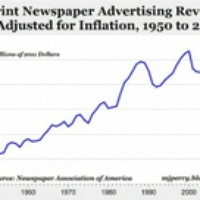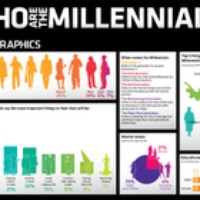The Future of Newspapers Remains Hopeful
The newspaper industry has been in trouble for years thanks to the Internet and democratization of media. Has it gone past the point of no return or is there still hope for a future for newspapers?
-

Once Upon A Time Newspapers Were King
http://www.marketingtechblog.com/infographic-the-decline-of-newspapers/#gsc.tab=0
As far as mass media goes, newspapers was the only medium until radio. Then TV. It always maintained respect (Watergate, Vietnam War) & money. Then came the Internet, changing the game forever.
-

Technology Changes How We Connect
http://www.bbc.co.uk/news/business-19476254
In the near future, "at least 5 billion people around the world will use some form of mobile device to download information & access knowledge." The Internet changed how we connect & consume info.
-

And Then There Were None, Or Really One
http://www.theblaze.com/blog/2012/02/29/a-picture-is-worth-1000-words-the-death-of-newspapers/
Goodbye, newspapers as we know it. Rounds & rounds of layoffs. Then, major newspapers closed, bought at bargain price like the Boston Globe. All because print newspapers couldn't compete with free.
-

Internet Babies Changed Distribution
http://www.vanityfair.com/culture/2014/05/newspaper-journalism-michael-kinsley
Before, reading digitally was unappealing. This changed. "Older people have died off and younger ones have been reading on a computer screen all their lives." A rise in the ereader market proves this.
-

FREEdom of the Press
Why milk the cow when it comes for free? This is the mindset that contributed to the loss of ad sales, readership & overall decline in newspapers. People are willing to pay, but for high quality.
-

People Pay For Things On The Internet Now
http://www.vanityfair.com/culture/2014/05/newspaper-journalism-michael-kinsley
Buying anything on the Internet has become ubiquitous, but it wasn't always that way. Changing how people buy things lead to how they could buy online content and consume news.
-

NY Times: Most Successful At Paid Online Content
http://www.vanityfair.com/culture/2014/05/newspaper-journalism-michael-kinsley
CEO Mark Thompson claims 'high quality' journalism will bring loyal customers and less advertising. Of course, Thompson says this high-quality strategy won’t work for any other paper except the Times.
-

Aggregator Journalism Is On The Rise
http://www.vanityfair.com/culture/2014/05/newspaper-journalism-michael-kinsley
'Thieves' of traditional papers are considered aggregators who curate information from sources in the age of globalization. The most famous example, however, of an aggregator is the _Associated Press_. It's companies like _The Huffington Post_ that threaten newspapers the most.
-

Ye Of Little Faith: There Is Hope (Sort of)
http://www.vanityfair.com/culture/2014/05/newspaper-journalism-michael-kinsley
Tech giants and gurus Amazon CEO Jeff Bezos and Chris Hughes of Facebook are buying [rint newspapers and magazines. There is competition, just among higher quality papers. People still WANT to consume news and are more open to digital. The future has hope.
-

Journalism and Tech Need to Work Together
Journalism and tech need one another to survive—journalists need technologists analytical and software skills and technologists need journalists storytelling capabilities. The excellency of newspapers and magazines rely on a partnership built on patience, transparency and respect.